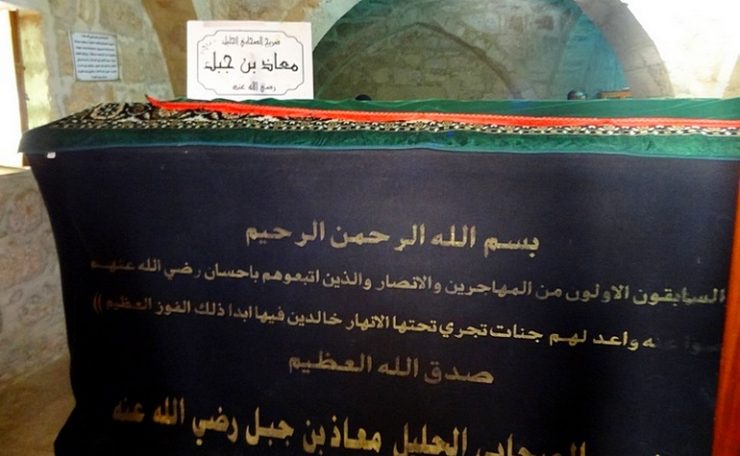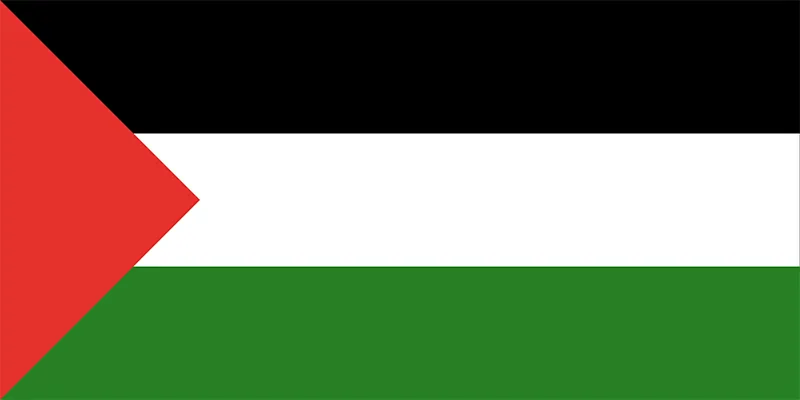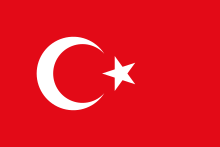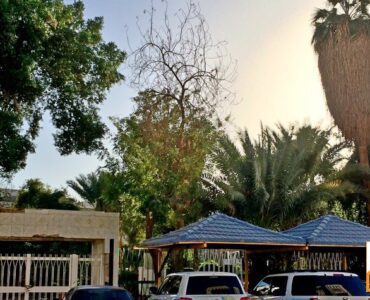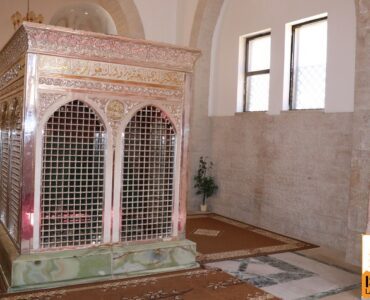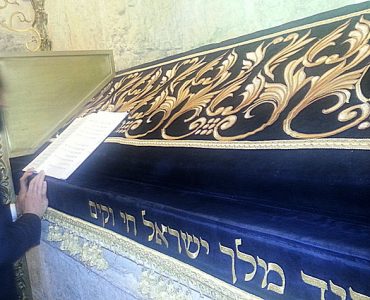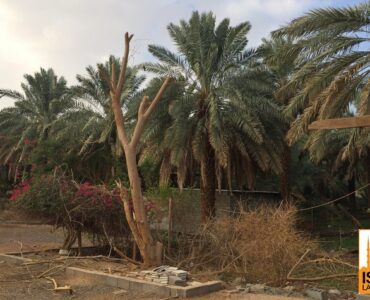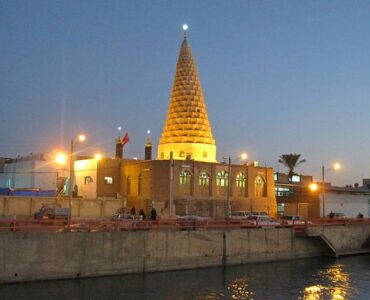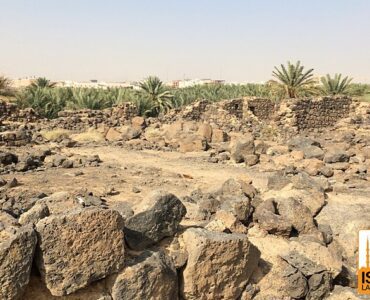This is the tomb of Muadh-bin-Jabal (رضي الله عنه), an eminent Sahabi about whom the Prophet (ﷺ) once said, “The most knowledgeable of my ummah in matters of halal and haram is Muadh-bin-Jabal.”
- Muadh (رضي الله عنه) was an Ansari who became a Muslim at a young age at the hands of Musayb-bin-Umair (رضي الله عنه), whom the Prophet (ﷺ) had sent to Yathrib (Madinah) before the Hijrah. When the Prophet (ﷺ) reached Madinah, Muadh stayed in his company as much as possible. He studied the Quran and the laws of Islam until he became one of the most well-versed of all the companions in the religion of Islam. Wherever Muadh went, people would refer to him for legal judgements on matters over which they differed.
- He was from the Khazraj tribe in Madinah and was among the 70 people who had taken the pledge of Aqabah prior to the Hijrah of the Prophet (ﷺ). At that time he was so young that he did not even have a beard. At the time of Badr he was only 20 years old and thereafter fought in every battle with the Prophet (ﷺ). It was only in the Battle of Hunain that he was absent because the Prophet (ﷺ) had sent him to Makkah to teach Islam to the new Muslims.
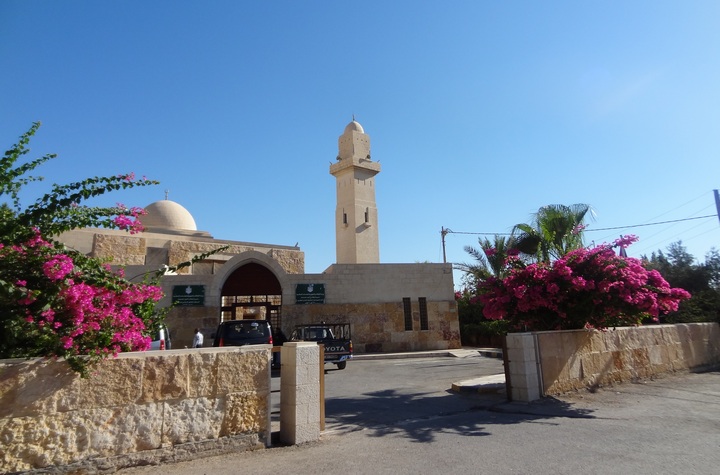

- Sometime after the Prophet (ﷺ) had returned to Madinah, messengers of the kings of Yemen came to him announcing that they and the people of Yemen had become Muslims. They requested that some teachers should be with them to teach Islam to the people. For this task the Prophet (ﷺ) commissioned a group of competent da’ees (missionaries) and made Muadh-bin-Jabal their amir. He then put the following question to Muadh: “According to what will you judge?”. “According to the Book of Allah,” replied Muadh. “And if you find nothing therein?”. “According to the Sunnah of the Prophet of Allah.”. “And if you find nothing therein?”. “Then I will exert myself (exercise ijtehad) to form my own judgement.” The Prophet (ﷺ) was pleased with this reply and said: “Praise be to Allah who has guided the messenger of the Prophet to that which pleases the Prophet.” The Prophet (ﷺ) personally walked for some distance alongside Muadh as he rode out of the city.
- When it came time to bid farewell the Prophet (ﷺ) said to Muadh, “O Muadh, perhaps you shall not meet me again after this year. Perhaps when you return you shall see only my mosque and my grave.” Muadh (رضي الله عنه) wept upon hearing this as he knew in his heart that he was never to meet the Prophet (ﷺ) in this world again. A feeling of sadness and desolation overtook him as he parted from the Prophet (ﷺ). The Prophet’s premonition was correct, the eyes of Muadh (رضي الله عنه) never beheld the Prophet after that moment. The Prophet (ﷺ) died before Muadh returned from Yemen.
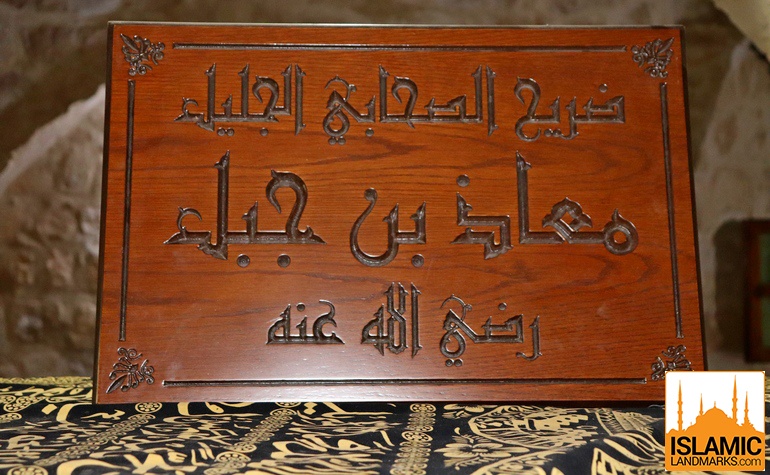

- When Abu Ubaidah bin Jarraah (رضي الله عنه) was afflicted by the plague, he appointed Muadh (رضي الله عنه) as the governor of Shaam. During this time a plague had gained rapid momentum and affected many people. Muadh (رضي الله عنه) addressed the people saying he heard the Prophet (ﷺ) say, “You people will migrate to Shaam and you will conquer this land. Thereafter such a sickness will appear which will be like sores and boils. Allah Ta’ala will bless you with Shahada (martyrdom) and purify your actions.”
- Thereafter, he made the following dua, “O Allah, if Muadh really heard this from the Prophet (ﷺ), then bless him and his family with this virtue”. The plague then entered his home and no one from his family was spared. When he saw the signs of the plague appearing on him he smiled and said, “If someone had to give me red camels in exchange of this it would not please me.” Someone began crying when he saw his condition. Muadh bin Jabal (رضي الله عنه) asked him, “Why are you crying?” This person replied, “I am not crying over any worldly benefit which I acquired from you, rather I am crying at the loss of the ilm (knowledge) I used to gain from you.” Muadh (رضي الله عنه) consoled him saying, “Don’t cry over that as well. Look at Ebrahim (عليه السلام). He was born and brought up in places where there was no knowledge. Allah Ta’ala blessed him with knowledge. After my demise, you should obtain knowledge from four people. Abdullah bin Mas’ood, Salman Farsi, Abdullah bin Salaam and Abu Darda (رضي الله عنهم).”
- Muadh (رضي الله عنه) died in Jordan during the 18th year after Hijra, at the age of 38. His son is also buried close to him.
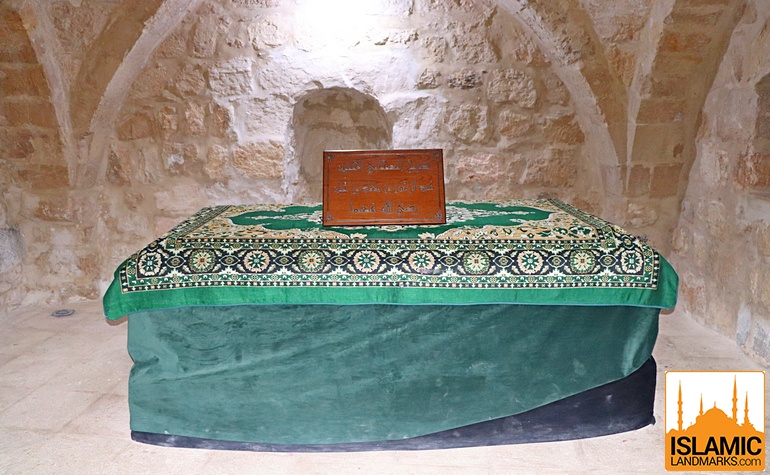

- Many visitors have commented on the lovely fragrance that is present in the room where he is buried. Caretakers have insisted they have never applied anything there.
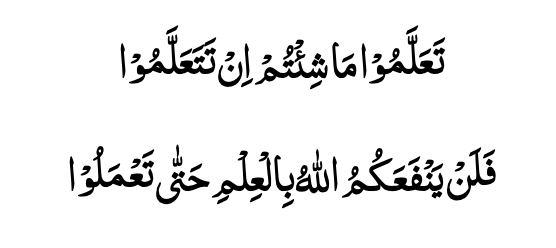

You may attain as much knowledge as you wish
Saying on the tomb of Muadh bin Jabal (رضي الله عنه)
But Allah will not allow that knowledge to benefit you so long as you
do not practice on it
References: Men around the Messenger – Khalid Mohammed Khalid, Wikipedia, In the Blessed Lands: Jamiatul Ulama KZN
Note that this entry has been shown for information purposes only. On no account should anybody pray to a grave or seek supplication through them as this is tantamount to committing shirk, associating partners with Allah (ﷻ)

